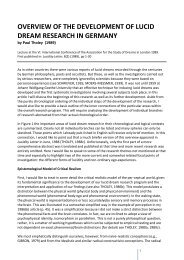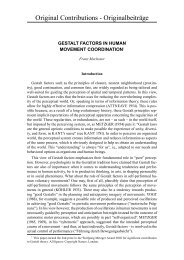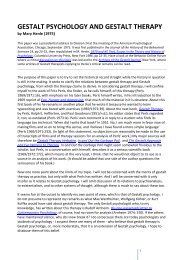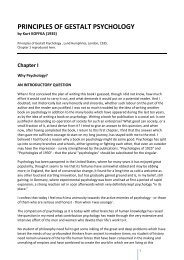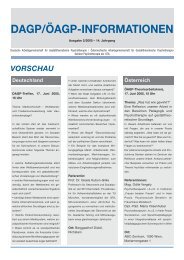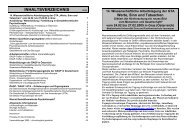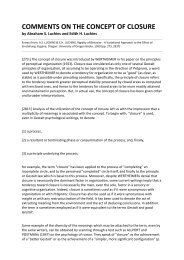on schulte, wertheimer, and paranoia - Society for Gestalt Theory ...
on schulte, wertheimer, and paranoia - Society for Gestalt Theory ...
on schulte, wertheimer, and paranoia - Society for Gestalt Theory ...
Create successful ePaper yourself
Turn your PDF publications into a flip-book with our unique Google optimized e-Paper software.
3. There is some support <strong>for</strong> this view. In experiments with hallucinogenics, students start to show<strong>paranoia</strong> when they stop knowing what is really going <strong>on</strong>, i.e., this is an experiment, that is an MD,I'm being paid to do this, etc. The same explanati<strong>on</strong> probably relates to the increased <strong>paranoia</strong>seen in people who are deaf, new immigrants, after cataract surgery when visual images areinterfered with, etc., etc. - all situati<strong>on</strong>s in which there is a breakdown in the usual ability to "knowwhat is going <strong>on</strong>."4. Obviously, <strong>on</strong>e could say that in all the situati<strong>on</strong>s discussed in 3, there is a reducti<strong>on</strong> in "weness,"but I d<strong>on</strong>'t believe that is adds anything, <strong>and</strong> is rather too narrow. There is a breakdown inknowing what's going <strong>on</strong>. For example, I was walking past a parked car <strong>on</strong>e day <strong>and</strong> the windshieldwipers moved. I thought "Did I bang something, is there a light beam that I passed through?" Iwalked back to inspect it <strong>and</strong> they moved again. Then I realized the car had been turned off withthe windshield wipers <strong>on</strong> automatic. But in the presence of a new situati<strong>on</strong> that I didn'tunderst<strong>and</strong>, my first impulse was to be self-referential.Am<strong>on</strong>g biologically-oriented psychiatrists c<strong>on</strong>cerned with <strong>paranoia</strong> or schizophrenia, currently theemphasis is <strong>on</strong> neurotransmitters <strong>and</strong> neurochemistry. They may speculate about why patients dothis or that acti<strong>on</strong>, but they are usually more c<strong>on</strong>cerned with why patients have obsessi<strong>on</strong>s thanwith the particular obsessi<strong>on</strong>s. Neurotransmissi<strong>on</strong> drugs <strong>and</strong> their effects, e.g., <strong>on</strong> dopamine, d<strong>on</strong>ot have to do with treatment of specific problems or acti<strong>on</strong>s. Why do patients repeatedly washtheir h<strong>and</strong>s, check the door or the stove, or have ideas of reference of persecuti<strong>on</strong>? Morediscussi<strong>on</strong> is needed of the c<strong>on</strong>tent as well as of the functi<strong>on</strong> <strong>and</strong> purpose of <strong>paranoia</strong> in specificcases.**Remark added by A.S. Luchins:With the drug approach, is there no place <strong>for</strong> psychotherapy to help the patient c<strong>on</strong>struct a livableworld <strong>and</strong> take care of his everyday problems in the social field? My experiences indicate thatdrugs do not obviate psychosocial interventi<strong>on</strong> which, moreover, can have the added dividend ofhelping the patient to comply with his drug regime. It is noteworthy that the biologically-orientedpsychiatrist whose views were cited above believes that there should be more c<strong>on</strong>cern with thespecific c<strong>on</strong>tent of the <strong>paranoia</strong>.Copyright © 1997 , A.S. Luchins. D.J. Luchins. All Rights Reserved.These papers were prepared as a c<strong>on</strong>tributi<strong>on</strong> to the discussi<strong>on</strong> in the psychotherapy secti<strong>on</strong> ofthe GTA about the SCHULTE theses <strong>on</strong> <strong>paranoia</strong>. They were translated into German by GerhardStemberger; this German versi<strong>on</strong> was published in ÖAGP-In<strong>for</strong>mati<strong>on</strong>en, 6 (1/1997), pp II-VII.5



